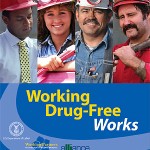[This is the third in a series of articles by Kim Wilbur, operations manager for a local company. To view all of Kim’s blogs please visit the Blog Series: Employee Drug Testing homepage.]
Federal Laws
Now that I want to start drug testing our employees what do I do? Maybe the question is, “what do I HAVE to do?” I thought I had better first find out what the laws and requirements are, so I started doing some research. The federal laws that your business must adhere to will vary depending on the amount of employees you have on staff and the type of business you have. See below for a brief summary of applicable laws and how they relate to creating a drug-free workplace policy.
Fifteen or More Employees
American with Disabilities Act of 1990
A federal law that protects people with disabilities from discrimination. The importance of the ADA is to ensure that employers evaluate an individuals’ ability to do the required job tasks and that they make employment decisions based on an individual’s qualifications and performance not the person’s history of drug or alcohol abuse. For more information see the Department of Labor’s ADA page.
The Civil Rights Act of 1964
This landmark bill prohibits private employers from discriminating against individuals on the basis of race, sex, religion, or nationality. Employers are required to ensure that their drug free workplace policy and programs treat all workers equally and avoid singling out any particular racial, ethnic, or gender group for drug or alcohol testing or disciplinary action. _____________________________________________________________________________________
Fifty or More Employees
Family and Medical Leave Act of 1993
This act enables employees to take up to 12 weeks of unpaid leave within a 12 month period, due to a serious health problem or a substance abuse problem as long as they have worked for an employer for at least 1 year. For more information see the Department of Labor’s FMLA page. _____________________________________________________________________________________
Unionized Industries
National Labor Relations Act
This act requires that a drug testing policy that affects union workers, must be negotiated and agreed upon with the union itself. Even if the employer is mandated to have a policy because of the type of industry it is in, such as a transportation company, the employer must still work closely with the union to determine the specifics of the policy. For more information see the National Labor Relations Board site here.
Federal Government Contractors and Grantees Drug Free Workplace Act of 1988
This requires Federal contractors and all Federal grantees to agree that they will provide drug-free workplaces as a condition of receiving a contract or grant from a Federal agency. For more information see this page from the Department of Labor.
Transportation Industry The Omnibus Transportation Employee Testing Act of 1991
States that any employee performing safety-sensitive transportation functions, including ones in the “aviation, trucking, railroads, mass transit, and pipelines industries” are required to be drug and alcohol tested. Employee drug testing must be done pre- employment, in the event of reasonable suspicion, post-accident, return to duty and follow up, and at predetermined random rates. For more information see the Department of Transportation’s page.
Department of Defense
All contractors working for the Department of Defense who have access to classified information must create, maintain and enforce a drug free work place policy. The policies must be consistent with state laws and be agreed to by any relevant labor union. For more information see this official PDF from the military.
Other Federal Safety Sensitive Organizations
Other organizations that have similar drug testing policies to the US Department of Defense are the U.S. Department of Energy, the National Aeronautics and Space Administration (NASA), and the Nuclear Regulatory Commission. More information about their policies can be found on each agency’s Web site or in the Code of Federal Regulations.
Again these are basic overviews of the Federal laws that may apply to your business. To ensure that you are following the appropriate laws and regulations for your business so that you can avoid fines or being sued, you should consult a lawyer.
We hope this helped and that you found it interesting! Stay tuned for our next installment!





